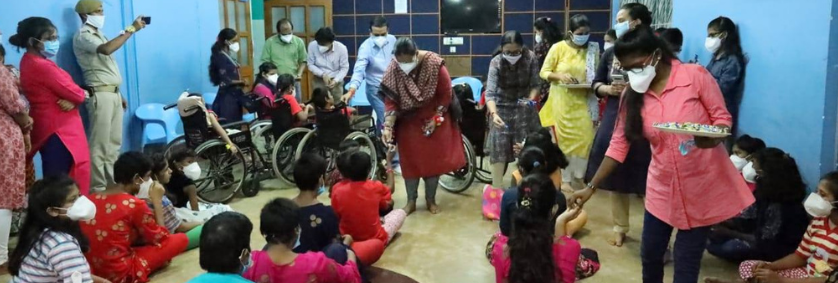Our Blog

03May 2022
Why do NGOs empower the people with disabilities in India?
Disability can be physical, cognitive, mental, sensory, emotional, or a combination of all of these; a person may be born with various impairments or suffer from them as a result of accidents. Disability is an umbrella that encompasses impairments, activity limitations and active participation limits - described by the international organisations. As a result, disability refers to a person's inability to continue working owing to a mental or physical handicap.
How does NGO help PWDs?
Disabled persons are at risk of being excluded from mainstream economic and social possibilities since disability is viewed as a development concern. However, like with every problem with a remedy, the designated NGO takes up the disability issue. Scientific and medical aspects draw attention to such persons, and non-governmental organisations (NGOs) have long been on the side of handicapped people.
Services they implemented for the PWDs
NGOs for individuals with disabilities in India have been a huge help by offering a wide range of services to challenged children and adults, as well as their families. Case management and treatment for behaviour support, as well as early childhood solutions for children aged 0 to 6, are the main focuses of appointed carers. Families also have the option of receiving respite care, which includes host families, in-home and centre-based programmes, counselling, and education groups. Day programmes, education, training, and job opportunities are all available to the youth. Officials from non-governmental organisations (NGOs) give support, information, & services to handicapped children and their families, assisting them in making educated decisions. They are responsible for promoting and defending the rights and interests of children.
Why do NGOs empower the PWDs in India?
NGOs rely on bodies to bring about the much-needed change and growth in society, and their size and variety vary dramatically. The following are the motivations that have guided them to success:
- Promoting non-profit organisations that attempt to achieve the goals of handicapped people
- Focusing on programmes and activities that offer handicapped and poor persons with empowerment and alleviation.
- Organizing actions to alleviate suffering and advance the interests of the underprivileged.
- Organizing and implementing community development projects to identify functional regions and expand membership beyond regional boundaries.
- Taking advantage of operational flexibility in decision-making and not be subject to government oversight.
- Self-sufficient in terms of the resources needed to undertake social projects.
- Organizing social work and involving the community at the greatest level of dedication.
There is a significant gap between the service needs for handicapped persons in school, vocational training, training and employment. At the same time, non-governmental organisations (NGOs) have taken on larger duties in providing financial aid and other services to the disabled.
SHARE THIS
0 Comment(s)
Leave a Comment
Latest Articles
-
How NGOs Help Elevate The Condition Of PWDs?
18th Mar, 2024 -
The Role Of Community-Based Rehabilitation Program......
08th Mar, 2024 -
How NGOs For Disabilities In India Champions For I......
16th Feb, 2024 -
The Role Of NGOs In Development Of Children With D......
05th Feb, 2024 -
How The Changing Rural Education System Is Shaping......
12th Jan, 2024






